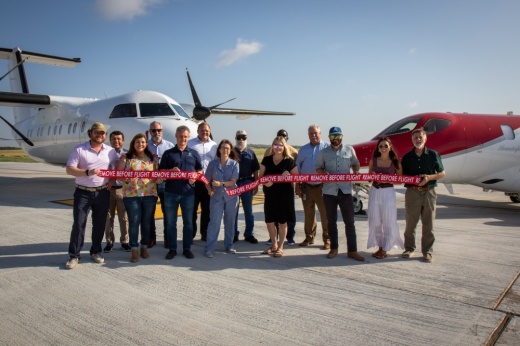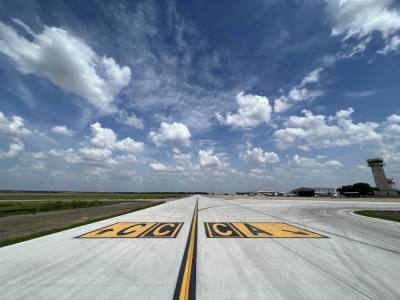Traffic at the airport includes a mix of student pilot training, cargo shipments and leisure/private flights.
The gist
While the runways for liftoffs and landings have been improved over the years, the reconstruction of the taxiways is part of an effort to replace World War II-era concrete along the taxiways and ramps.
The backstory
The city of San Marcos took over Gary Air Field, a World War II Army Air Corps training base, in 1966. The airport—which serves as a reliever airport for Austin-Bergstrom International Airport and the San Antonio International Airport as designated by the Federal Aviation Administration—is also used for a variety of freight and transportation purposes and has seen record flights this year, according to Texas Aviation Partners, the group that operates the airport.
Texas Aviation Partners was selected to oversee airport operations by the city in 2010.
The breakdown
The improvements come at a time the airport is reporting heavier traffic.
Through July of this year, 57,596 operations were recorded at the airport, said Cassidy Berenato, vice president of Texas Aviation Partners.
Operations ticked up significantly in recent years from 63,955 in 2019 to 91,852 in 2022, a 43.62% increase.
“As you can see, so far this year we have broken records every month—despite this outrageous heat,” Berenato said. “Per the tower, we’re on track to reach 95,000 takeoffs and landings this year, but I have my fingers crossed for 100,000.”
The takeaway
Other improvements include new signage, markings and LED lighting system to improve visibility for pilots.
Funding came from the Federal Aviation Administration through a grant awarded by the Texas Department of Transportation along with a supplemental allocation from the city of San Marcos from its general fund. The city’s contribution of $539,273 brought the total funding to $5.39 million.
Taxiway Alpha reconstruction is expected to begin later this year, and its cost will be roughly split with 90% federal funding and 10% city funding, as was the case with Taxiway Charlie, according to the city.
“We anticipate Taxiway Alpha will follow the same general timeline depending on when [the] FAA releases the funding—it could begin earlier,” Berenato said. “So it would be safe to say late 2023 or early 2024.”






